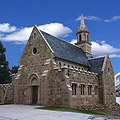Traditional Lime Mortars and Lime Pointing
Traditional buildings rely on the ability of the construction and finishing materials to accommodate and control moisture movement. Many of Scotland’s historic buildings were originally coated internally and externally with lime plasters, renders or harling and finished in limewash. These lime coatings formed an effective method of weatherproofing solid masonry walls, forming a protective and decorative finish.
Lime pointing is perhaps the most common repair to historic buildings, either due to the gradual decay of original mortar or the application of inappropriate cement mortars. Pointing is crucial to the effective weatherproofing ability of the masonry wall, and the correct specification and application of the repair mortar is essential for material compatibility and performance.
The vast majority of LTM projects involve an element of repointing work, from masonry consolidation and deep packing of voids through to the reinstatement of original lime pointing finishes. LTM masons are trained to identify and replicate these historic finishes, ranging from flush pointing and ladder pinnings to fine ashlar pointing and sneck harling.
Featured Traditional Lime Mortars and Lime Pointing Case Studies

Private Chapel - Scottish Highlands
This project was one of the most exciting and unique for LTM’s stonemasons. It involved the unprecedented opportunity to combine traditional craft skills and building materials with modern construction technology ...

The Brig O’ Balgownie - Aberdeen
The Brig O’ Balgownie is a Category A Listed bridge spanning the River Don in Old Aberdeen. The original structure was built in 1314-18 under the orders of Richard Cementarius, the first provost of Aberdeen. It was largely rebuilt in the early 17th century and remained the only northern ...

Fettercairn Arch - Fettercairn
Fettercairn Arch is a Category B Listed Romanesque arch in the centre of Fettercairn village. It was built as a memorial to the Prince Consort and to commemorate the visit of Victoria and Albert in September 1861. It was designed by John Milne (of St Andrews) between 1864-5 and ...